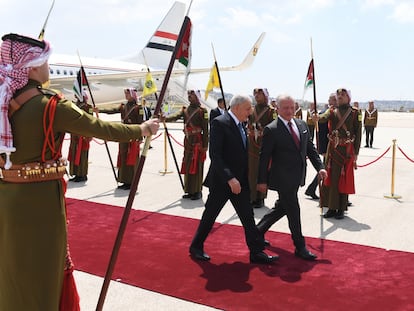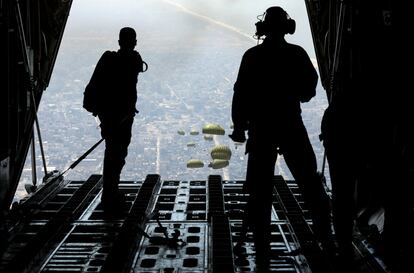Jordan, the only Arab country that neutralized Iran’s attack despite its disputes with Israel
The nation’s dependence on the United States and its distrust of Tehran outweighed the protests, sparked by the invasion of Gaza, over its peace agreement with the Jewish state

In the early hours of Sunday, videos recorded in the outskirts of Amman showing the debris of one of the more than 100 missiles that Iran launched against Israel began to appear on social media. The missile had been shot down by the Jordanian army, the only one in the Arab world to do so — despite the fact that the war in Gaza has pushed Jordan’s relationship with neighboring Israel to one of its lowest points since 1996, when the Jordan-Israel Peace Treaty was signed. One message on social media, which has more than 6,000 retweets and 19,000 likes, shared the video with a sarcastic comment in Arabic that summed up the feeling of much of the population: “The Jordanian king launches Iranian missiles against its citizens to protect Israel.”
The Hashemite kingdom’s decision to help contain the Iranian attack has sparked a lot of discussion. Jordan showed that — at a key moment — it valued its strong alliance with the United States and disapproval of Iran over its criticism of the war in Gaza (the harshest in the part of the Arab world that recognizes the Jewish state), its longstanding distrust of Israeli Prime Minister Benjamin Netanyahu and the fact that many sectors do not support the peace. Millions of its citizens are, in fact, Palestinian refugees. For weeks, hundreds of people have been demonstrating every day in front of the Israeli Embassy in Amman. Media outlets aligned with the authorities argue the protests are being organized by “external agents” who want to destabilize a country that borders Israel, the West Bank, Syria, Iraq, and Saudi Arabia. A country that likes to present itself as an oasis of peace in a turbulent Middle East. One of the words that Jordanians use the most is istiqrar (stability).
Amman shot down dozens of drones headed to Israel as they passed over Jordanian territory, in a joint operation with the United Kingdom, France, and the United States. These countries were allowed to enter Jordan’s airspace. Two other Arab countries — the United Arab Emirates and Saudi Arabia — gave Washington information about the attack that Tehran itself had passed on to them, according to a report published by The Wall Street Journal on Monday. They were the “other” countries that Israel Defense Forces (IDF) spokesperson Daniel Hagari thanked discreetly so as to not get them in trouble. Iran, the great Shiite power, inspires little sympathy among the Sunni populations of the Gulf. But helping Israel, after their Palestinian “brothers” have been dying and starving in Gaza for six months, would not be a popular move for these governments.
Precisely because it actively participated to contain Iran’s attack and was public about its actions, Amman’s decision has been just as applauded by Israel and the United States as it has been criticized by Iran and its allies. The Fars press agency, close to Iran’s Revolutionary Guard, citing a “well-informed source,” claimed that Tehran had told Amman that it would become the “next target” if it “cooperated” with Israel. In response, Jordan summoned the Iranian ambassador to warn Tehran that it must stop “questioning the Jordanian position.”
For Hasni Abidi, director of the Geneva-based Study and Research Center for the Arab and Mediterranean World, Jordan “had no choice” but to shoot down the missiles. “Its air defense is linked to the United States, from which it receives substantial military and financial aid, and it has a peace agreement with Israel with security obligations,” he explains in an email. According to Abidi, Jordan also has “bad relations with Iran” and “fears the destabilization” of the country.

Jordan also has fresh in its mind the recent statements made by Abu Ali al-Askari, a senior commander of Kata’ib Hezbollah, the powerful pro-Iran militia in Iraq. On April 3, Al-Askari said that the group could provide their allies in Jordan with “light and medium weapons, tactical missiles, anti-tank projectiles and tons of explosives” for “12,000 fighters” to defend “our brothers in Palestine.”
Black September
Few ideas raise more alarm in Jordan, a country that part of the Arab world has always seen as a kind of traitor. For its cooperation — both official and secret — with Israel and for Black September in 1970, when the Jordanian army killed thousands of militiamen of the Palestine Liberation Organization for preparing an insurrection and trying to establish a kind of parallel state.
Tuqa Nusairat, an expert on U.S. policy in the Middle East and North Africa at the Atlantic Council, recalls by phone that Jordan — a country the British created in 1921 under the name Emirate of Transjordan — is in a strategic position with little water and a lot of desert, and is “very vulnerable” without Washington’s support. “It is not a very rich country, but it has a diplomatic and security relationship with the United States that it wants to maintain.” Saturday’s decision, he says, is part of that “quid pro quo.” It receives funding, security guarantees and training for its troops in exchange for “keeping things calm” and “protecting U.S. interests in the region.”
Nusairat lists two other factors: Jordan did not want “to be accused of supporting in any way or looking the other way in an attack on another country” and “is in a very delicate position, with tensions on all its borders.” Indeed, Washington rushed to deploy Patriot missiles on its borders last year, when Amman feared that tensions over the Gaza war could end up affecting the country. In January, a pro-Iran militia killed three U.S. soldiers in Jordan, next to the Syrian border.
Aware of this balancing act and the fact that many Jordanians are seeing the images coming out of Gaza, Jordan’s Foreign Minister Ayman Safadi — the same politician who has been attacking Israel for months — justified the decision by claiming there was a “real danger of Iranian drones or missiles falling” inside the country. “The Armed Forces dealt with that threat,” just as if the attack “came from Israel,” he defended.
Jordan’s authorities are trying to navigate a delicate situation, fearing that the most Islamist sectors or those most critical of Israel will openly question the monarchy and the family clans of Bedouin origin, which are in power. On the one hand, Jordan’s parliament has voted to “review” the agreements with Israel and the executive has stopped a deal in the works on water and solar energy. On the other hand, it has repressed demonstrations in support of Palestine and ordered the removal of an “October 7” restaurant sign in Amman — the date of the Hamas attack that killed nearly 1,200 Israelis, sparking Israel’s invasion of Gaza. Many in the Arab world see the attack as revenge that Israel deserves for its treatment of the Palestinians.
In any case, it is difficult to ignore the historical symbolism of seeing Jordan — the same country that fought four wars against Israel, between 1948 and 1973 — stopping an attack against it. “It’s especially significant for a generation of Israelis who remember having taken refuge from Jordan’s attacks,” senior Israel analyst at the International Crisis Group think tank Mairav Sonszein recalled on Sunday. According to Sonszein, the lesson for Israel, where militarist and isolationist discourse is increasingly gaining ground, is that “diplomatic agreements are vital for stability.” A religious foundation under the tutelage of the Jordanian monarchy administers the Esplanade of the Mosques in Jerusalem, but they have more and more weight in the Israeli government and are making more and more visits to ultra-nationalist sectors that seek to annul the peace treaty and even demolish the complex to build a third Jewish temple.
Amid this context, Noa Landau, deputy editor of the Israeli newspaper Haaretz, wrote on Monday: “Netanyahu and his supporters should have apologized Sunday not only to Biden but also to the Jordanians.” After the attack, some opponents of the Israeli prime minister published one of the most iconic photos in the Middle East’s modern history: an image of King Hussein smiling as he lights a cigarette for Yitzhak Rabin after signing the Jordan-Israel Peace Treaty in 1994.
The relationship since then has had its ups and downs. In the past 30 years, Jordan has withdrawn its ambassador to Tel Aviv six times, most famously over a major fiasco by Mossad, Israel’s foreign spy service, and also in 2017, when an Israeli security guard killed two Jordanians on the embassy grounds and was greeted as a hero by Netanyahu.
The most recent is due to the war in Gaza, which has led Queen Rania to give two scathing interviews against Israel. Amman has tried to make up for the population’s discomfort with the fact that it maintains diplomatic ties with Israel with well-publicized airdrops of aid to Gaza — with King Abdullah himself pictured taking part — and trucks carrying humanitarian aid to the enclave.
Sign up for our weekly newsletter to get more English-language news coverage from EL PAÍS USA Edition
Tu suscripción se está usando en otro dispositivo
¿Quieres añadir otro usuario a tu suscripción?
Si continúas leyendo en este dispositivo, no se podrá leer en el otro.
FlechaTu suscripción se está usando en otro dispositivo y solo puedes acceder a EL PAÍS desde un dispositivo a la vez.
Si quieres compartir tu cuenta, cambia tu suscripción a la modalidad Premium, así podrás añadir otro usuario. Cada uno accederá con su propia cuenta de email, lo que os permitirá personalizar vuestra experiencia en EL PAÍS.
¿Tienes una suscripción de empresa? Accede aquí para contratar más cuentas.
En el caso de no saber quién está usando tu cuenta, te recomendamos cambiar tu contraseña aquí.
Si decides continuar compartiendo tu cuenta, este mensaje se mostrará en tu dispositivo y en el de la otra persona que está usando tu cuenta de forma indefinida, afectando a tu experiencia de lectura. Puedes consultar aquí los términos y condiciones de la suscripción digital.









































